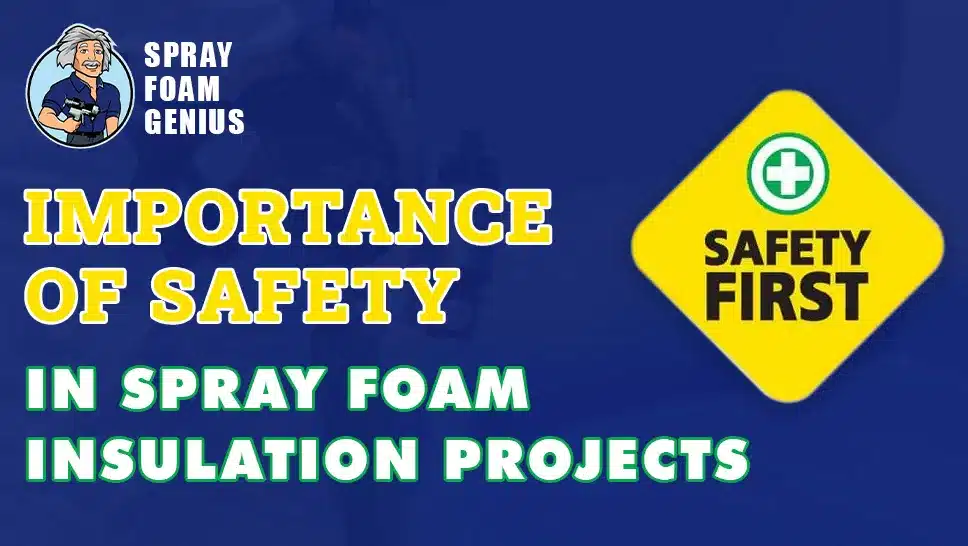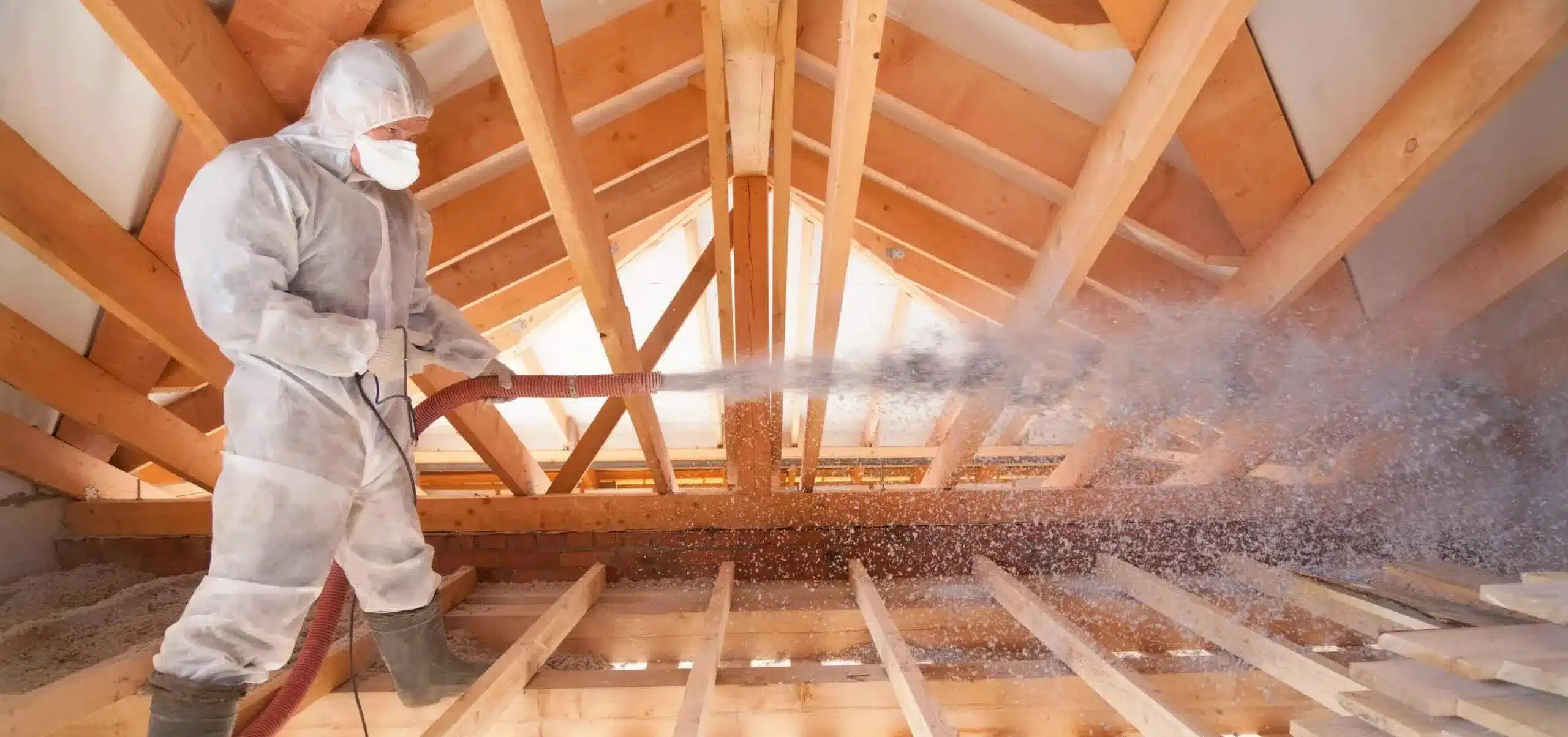
Spray foam insulation is a powerful solution for enhancing energy efficiency and comfort in buildings. Despite its numerous advantages, including superior thermal insulation and air sealing capabilities, it comes with specific safety risks that must be managed meticulously. At Spray Foam Genius Marketing, our commitment extends beyond helping spray foam insulation contractors optimize their online presence; we also prioritize promoting best practices for safety in the industry. This in-depth guide explores the crucial aspects of safety in spray foam insulation projects, offering valuable insights for contractors across the USA and Canada.
Understanding Spray Foam Insulation
What is Spray Foam Insulation?
Spray foam insulation is a modern and effective way to insulate and seal buildings. It consists of a two-part chemical system—polyurethane and isocyanate—that reacts when mixed, creating a foam that expands and hardens. This foam is applied directly to surfaces, filling gaps and forming a continuous barrier against air and moisture. There are two primary types of spray foam:
- Open-Cell Foam: Known for its lower density and flexibility, open-cell foam is ideal for applications where soundproofing is desired. It has a lower R-value compared to closed-cell foam but is cost-effective and provides good thermal insulation.
- Closed-Cell Foam: Denser and more rigid, closed-cell foam offers a higher R-value, providing superior insulation and moisture resistance. It adds structural strength to the building and is often used in areas exposed to moisture, such as basements and crawl spaces.
Benefits of Spray Foam Insulation
- Energy Efficiency: Spray foam provides a high R-value per inch, enhancing the thermal efficiency of buildings and reducing energy consumption.
- Air Sealing: The expanding nature of spray foam creates an air-tight seal, minimizing drafts and preventing moisture infiltration.
- Soundproofing: Open-cell spray foam helps in sound absorption, making it a popular choice for reducing noise in residential and commercial buildings.
Safety Concerns in Spray Foam Insulation
Chemical Exposure Risks
Spray foam insulation involves chemicals that can pose health risks if not handled correctly. The primary chemicals include:
- Isocyanates: These chemicals are known to be irritants and can cause respiratory problems, skin irritation, and other health issues if inhaled or contacted. Proper handling and protective measures are essential to mitigate these risks.
- Polyols: Often used alongside isocyanates, polyols can also be hazardous, particularly if there is prolonged exposure.
Ventilation Issues
Proper ventilation is crucial when working with spray foam insulation. The chemicals used can emit harmful fumes if inhaled in high concentrations. Inadequate ventilation can lead to:
- Respiratory Problems: Exposure to fumes can cause short-term issues such as coughing and shortness of breath, and long-term exposure may lead to chronic respiratory conditions.
- Chemical Reactions: Poor ventilation can cause the chemicals to linger, potentially reacting with other substances or causing unpleasant odors.
Personal Protective Equipment (PPE)
To ensure safety, contractors must use the appropriate PPE:
- Respirators: High-quality respirators equipped with filters designed to capture isocyanate fumes are essential for protecting the respiratory system.
- Gloves: Chemical-resistant gloves prevent skin contact with potentially harmful substances.
- Protective Clothing: Coveralls or other protective clothing help prevent chemical splashes from coming into contact with the skin.
- Safety Goggles: Goggles protect the eyes from irritants and accidental splashes.
Fire Safety
Before the spray foam fully cures, it remains flammable. It is vital to:
- Remove Ignition Sources: Ensure that no open flames or sparks are present in the area where spray foam is being applied.
- Allow Proper Curing Time: Follow manufacturer guidelines for curing times before reintroducing heat sources or electrical equipment.
Implementing Effective Safety Protocols
Training and Certification
Proper training and certification are crucial for ensuring that all team members understand the safety requirements of spray foam insulation. This includes:
- Chemical Handling: Training on the safe handling of isocyanates and polyols.
- Emergency Procedures: Instructions on what to do in case of spills, exposure, or other emergencies.
- Equipment Use: Ensuring that all staff are proficient in using the equipment safely and effectively.
Equipment Maintenance
Regular maintenance of spray foam application equipment is vital to prevent safety hazards. This includes:
- Inspection: Regularly check hoses, spray guns, and compressors for signs of wear and tear.
- Cleaning: Properly clean equipment after use to prevent clogging and ensure smooth operation.
- Repairs: Address any issues promptly to avoid malfunctions during application.
Site Preparation
Proper site preparation helps mitigate risks and ensures a safe working environment:
- Remove Flammable Materials: Clear the area of any flammable materials before starting the application.
- Secure the Area: Restrict access to the work area to authorized personnel only to prevent accidental exposure to chemicals.
- Ventilation Setup: Use fans or ventilation systems to ensure adequate airflow and reduce the concentration of harmful fumes.
Legal and Regulatory Compliance
OSHA Regulations
In the USA, the Occupational Safety and Health Administration (OSHA) sets regulations for handling hazardous materials and ensuring workplace safety. Compliance includes:
- Hazard Communication: Properly labeling chemicals and providing safety data sheets (SDS) to all employees.
- Personal Protective Equipment: Ensuring that all required PPE is used and maintained.
Local Codes and Standards
In Canada, adherence to local building codes and standards is crucial. The National Building Code (NBC) and various provincial regulations govern insulation practices, including:
- Installation Requirements: Follow specific guidelines for spray foam installation to ensure safety and performance.
- Environmental Compliance: Ensure that practices align with environmental regulations for waste disposal and emissions.
Best Practices for Safe Spray Foam Insulation Projects

Conducting Risk Assessments
Before starting a project, perform a thorough risk assessment to identify potential hazards and implement mitigation strategies. This includes evaluating:
- Chemical Risks: Assess the types and quantities of chemicals used and their potential impact.
- Work Environment: Examine the physical conditions of the site, including ventilation and access.
- Emergency Scenarios: Plan for possible emergencies and ensure all team members are aware of the procedures.
Regular Safety Meetings
Hold regular safety meetings to review protocols, discuss any new safety concerns, and update the team on best practices. These meetings should:
- Review Incidents: Analyze any safety incidents or near-misses to prevent recurrence.
- Update Procedures: Incorporate new safety guidelines or technologies as they become available.
Emergency Preparedness
Having a well-defined emergency response plan is essential. This plan should include:
- First-Aid Procedures: Basic first-aid instructions for common injuries related to spray foam application.
- Emergency Contacts: Contact information for local emergency services and poison control centers.
- Evacuation Plans: Clear instructions for evacuating the work area in case of a major incident.
The Role of Spray Foam Genius Marketing in Enhancing Safety
At Spray Foam Genius Marketing, our mission extends beyond digital marketing; we are dedicated to supporting spray foam contractors in all aspects of their business. By focusing on safety, we help contractors create a reliable and efficient work environment. Our expertise in SEO, Google My Business optimization, and other digital services ensures that your business not only thrives online but also adheres to industry best practices for safety.
How We Can Help
- Website Development: Create a website that not only attracts clients but also provides valuable information on safety practices.
- Local SEO: Optimize your local presence to reach clients who value safety and professionalism.
- Reputation Management: Build and maintain a positive reputation by highlighting your commitment to safety and quality.
Take Your Spray Foam Business to the Next Level!
Safety in spray foam insulation projects is paramount. Understanding the potential risks and implementing rigorous safety measures protects not only your team but also your clients and business reputation. At Spray Foam Genius Marketing, we are committed to supporting spray foam contractors in achieving excellence through safe and effective practices.
For further assistance with enhancing your online presence and ensuring safety in your spray foam projects, contact us at 877-840-FOAM for USA and 844-741-FOAM for Canada, visit our website at https://sprayfoamgeniusmarketing.com/, or email us at [email protected].
- How to Use Pinterest to Market Your Spray Foam Insulation Services - December 27, 2023
- How to Use LinkedIn to Grow Your Spray Foam Insulation Business - December 23, 2023
- How to Use Instagram to Showcase Your Spray Foam Insulation Projects - December 16, 2023

